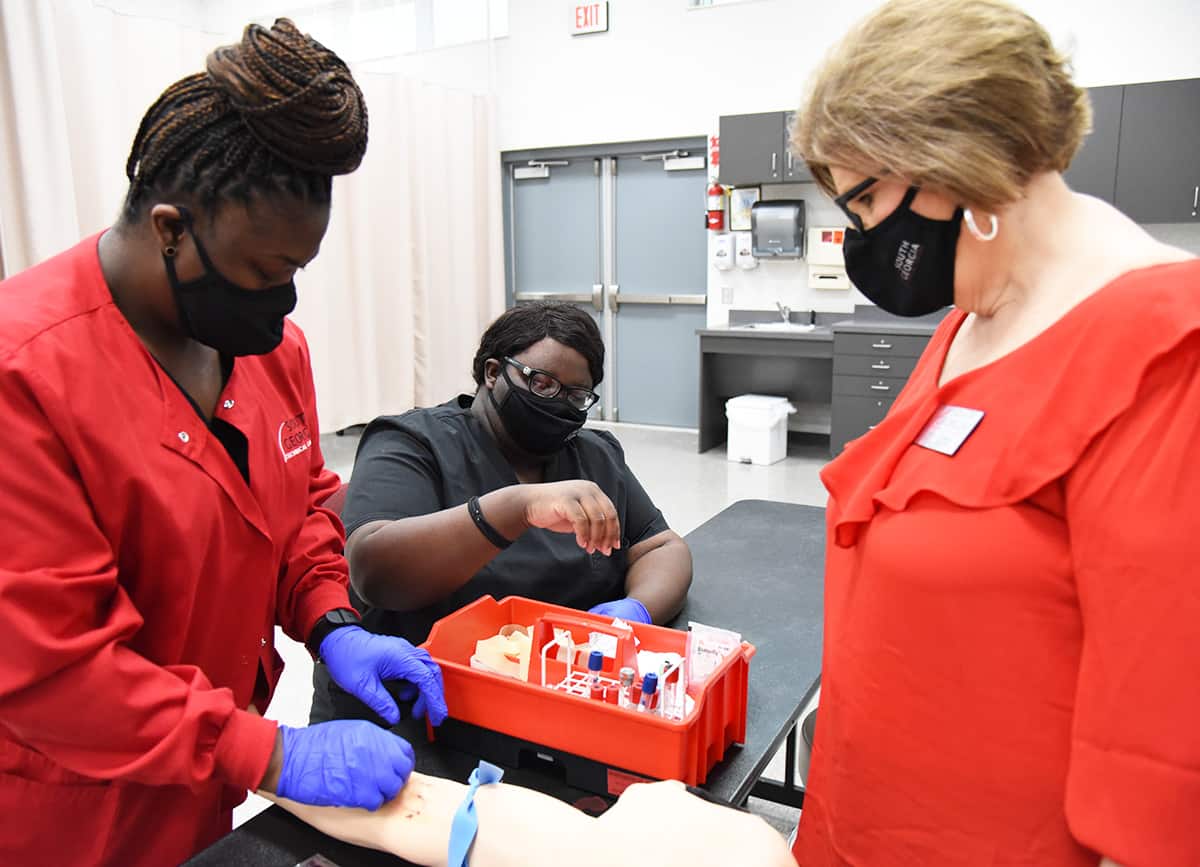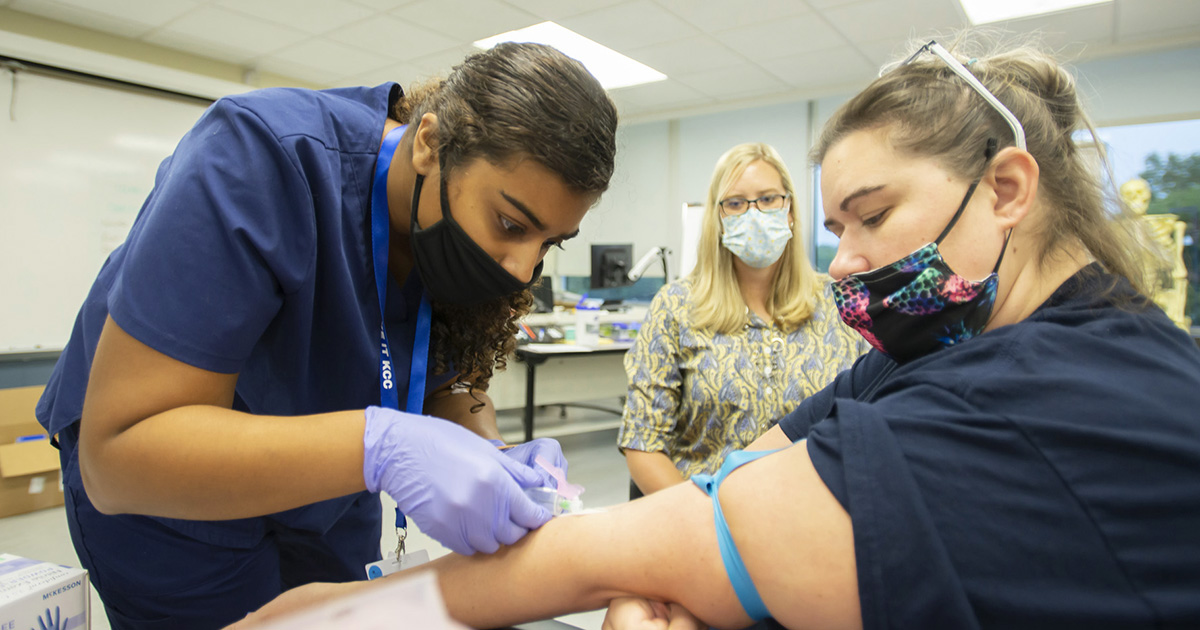Your Step-by-Step Guide to Starting Phlebotomy school With Confidence
Wiki Article
The Course to Qualification: Comprehending the Phlebotomy Educating Program Trip and Its Value
As you consider the path to certification in phlebotomy, it is very important to comprehend the duty you'll play in health care. Your training will certainly cover crucial abilities, from blood collection techniques to patient interaction. Each part of the program prepares you for the challenges in advance. But just what does the trip entail, and why is qualification so vital for your future profession? Let's explore these questions even more.
The Role of Phlebotomists in Healthcare
Phlebotomists play a necessary duty in the medical care system, serving as the important link between clients and important diagnostic testing. You'll perform blood attracts, ensuring examples are gathered properly and safely. Your know-how aids in diagnosing medical conditions, monitoring health and wellness, and leading treatment choices.In your everyday interactions, you'll require to establish trust with patients, making them feel comfortable during what may be a difficult experience. You are in charge of identifying and managing samples thoroughly to stop contamination or mistakes, which can influence test results.
Yet, you'll usually work alongside doctors and nurses, interacting critical details regarding individuals' problems. Your function is essential in maintaining the operations in medical care setups, ensuring timely and precise outcomes. By understanding your abilities, you add meaningfully to client treatment, making you a vital part of the medical group. Welcoming this duty is crucial to your success as a phlebotomist.
Introduction of Phlebotomy Training Programs
When checking out phlebotomy training programs, you'll discover numerous types developed to fit different routines and finding out styles. Each program assists you establish vital abilities like blood collection and person interaction. Comprehending these choices is vital to selecting the appropriate course for your occupation.Sorts Of Training Programs
Numerous kinds of training programs are offered for those looking to become skilled in phlebotomy. You can pick from certification programs, which commonly last a couple of months and concentrate on necessary skills. There are also diploma programs that supply a more complete education, frequently lasting approximately a year. If you're trying to find a deeper understanding, an associate level in an associated field could be the right fit. Online training courses use flexibility for those balancing work or household commitments, permitting you to examine at your own pace. In addition, some hospitals and clinics supply on-the-job training programs, offering functional experience while you discover. Whatever path you select, each program aims to outfit you with the needed skills for a successful phlebotomy occupation.
Secret Skills Established
Mastering phlebotomy calls for a set of essential abilities that are established with thorough training programs. Additionally, communication abilities are fundamental; you'll need to communicate with clients, explain procedures, and put them at simplicity. Each of these abilities is crucial for your success as a licensed phlebotomist, making you a beneficial property in any kind of health care setting.Secret Parts of a Phlebotomy Training Course
In a phlebotomy course, you'll concentrate on crucial subjects that lay the groundwork for your future career. You'll participate in hands-on training that permits you to use what you have actually found out in real-world setups. Both the curriculum and functional experience are crucial for your success as a phlebotomist.Core Educational Program Review
While going after a phlebotomy training course, you'll experience a core educational program designed to furnish you with essential abilities and expertise. Phlebotomy Classes Near Me. This curriculum generally consists of anatomy and physiology, concentrating on the blood circulation system and understanding blood elements. You'll likewise learn more about different kinds of blood collection techniques, including venipuncture and capillary leak methodsAdditionally, infection control and safety methods are important parts, guaranteeing you recognize how to preserve a sterile environment. You'll examine patient communication, highlighting interaction and compassion, which are crucial for reducing client anxiety. Honest and lawful factors to consider will certainly be resolved, preparing you for real-world duties. This foundational knowledge will certainly enable you to succeed as a phlebotomist and give high quality care in scientific setups.
Hands-On Training Experience
Obtaining hands-on experience is an indispensable component of your phlebotomy training course. This sensible training allows you to use what you have actually discovered in a real-world setup, improving your skills and confidence. You'll practice venipuncture strategies, find out exactly how to manage different kinds of samplings, and get aware of the tools made use of in the area. Under the advice of experienced instructors, you'll fine-tune your skills, guaranteeing you're gotten ready for any kind of circumstance you could face.Furthermore, you'll obtain the possibility to communicate with people, which is essential for developing your communication skills. This combination of technical effectiveness and social skills is crucial for your success as a licensed phlebotomist. Eventually, hands-on training is where theory satisfies method, solidifying your understanding and preparedness for certification.
Certification and Licensing Demands
Before you can begin your career in phlebotomy, it is essential to comprehend the accreditation and licensing requirements that vary by state. The majority of states Phlebotomy school need phlebotomists to hold a qualification from an acknowledged company, such as the National Phlebotomy Association or the American Culture for Clinical Pathology. These certifications typically entail passing an examination that checks your expertise and abilities in the field.Along with certification, some states have details licensing demands. You might need to finish a specific number of hours in clinical technique, send proof of training, or go through a background check. It is necessary to research your state's laws to make sure you fulfill all necessary criteria.
Staying informed concerning these needs not just aids you protect a setting however also improves your trustworthiness as an expert. By fulfilling these requirements, you'll be well on your way to a successful occupation in phlebotomy.
Hands-On Training and Practical Experience
Hands-on training and useful experience are vital parts of your phlebotomy education and learning, as they enable you to use academic knowledge in real-world situations. During your training, you'll take part in monitored venipuncture, learn appropriate strategies, and come to be knowledgeable about numerous blood collection devices. This straight involvement is critical for building your self-confidence and sharpening your skills.You'll work carefully with experienced experts who can assist you with the subtleties of patient communication and sample handling. Each practice not just reinforces your understanding but also prepares you for the busy environment of medical care setups.
In addition, many programs include clinical rotations, permitting you to experience diverse settings, from healthcare facilities to outpatient facilities. This exposure aids you adapt to different challenges and patient requirements, guaranteeing you're well-prepared for your future duty. Embrace these possibilities, as they're important to becoming a qualified and thoughtful phlebotomist.
Obstacles Faced Throughout Training
While getting hands-on experience is essential, it's essential to acknowledge the difficulties that can develop throughout your phlebotomy training. In addition, grasping the skills needed for blood draws takes method; you may battle with method initially.Time monitoring can additionally be an obstacle, as harmonizing concept, sensible sessions, and individual dedications can really feel daunting. You might deal with differing discovering rates among your peers, resulting in sensations of self-doubt if you believe you're falling behind. Adjusting to the different personalities of instructors can be challenging, as each may have a distinct training design.
Acknowledging these challenges early on can prepare you for success and assist you create resilience throughout your training journey.
Career Opportunities After Qualification

As you obtain experience, you may also take into consideration focusing on areas like pediatric or geriatric phlebotomy, dealing with particular client needs. Some phlebotomists choose to advance their professions by becoming laboratory specialists or seeking additional education in health care fields.
In addition, your certification can cause duties in training or overseeing brand-new phlebotomists, permitting you to share your understanding. With the health care sector consistently growing, your abilities will constantly remain in need, paving the way for a steady and satisfying occupation. Welcome the chances awaiting you!
Frequently Asked Inquiries
What Is the Typical Duration of a Phlebotomy Educating Program?
Phlebotomy training programs commonly last around four to eight weeks. You'll involve in hands-on technique, class direction, and online understanding. Completing this training prepares you for certification and a fulfilling occupation in medical care.Are Online Phlebotomy Courses Available?
Yes, on-line phlebotomy courses are offered. They provide adaptability and benefit, allowing you to research at your very own speed. Simply verify the program is accredited to fulfill accreditation needs and obtain valuable abilities for your career.Exactly How Much Does Phlebotomy Training Commonly Cost?
Phlebotomy training generally sets you back in between $700 and $2,500, relying on the program and place. You should take into consideration aspects like course size, consisted of products, and hands-on experience when selecting the ideal training for you.What Are Typical Requirements for Phlebotomy Training?
Typical prerequisites for phlebotomy training typically include a secondary school diploma or GED, immunizations, and a background check. Some programs might also need standard healthcare knowledge or accreditations, ensuring you're planned for hands-on training.Can I Function While Finishing My Phlebotomy Training?
Yes, you can work while completing your phlebotomy training. Lots of students balance jobs with their studies, but make sure to handle your time efficiently to ensure you meet both job and training commitments effectively.Report this wiki page